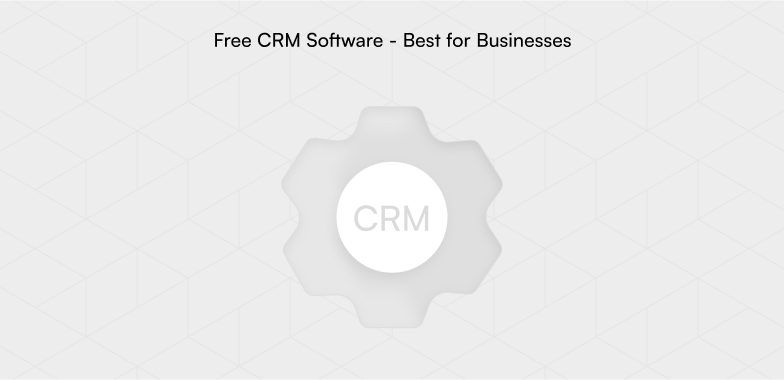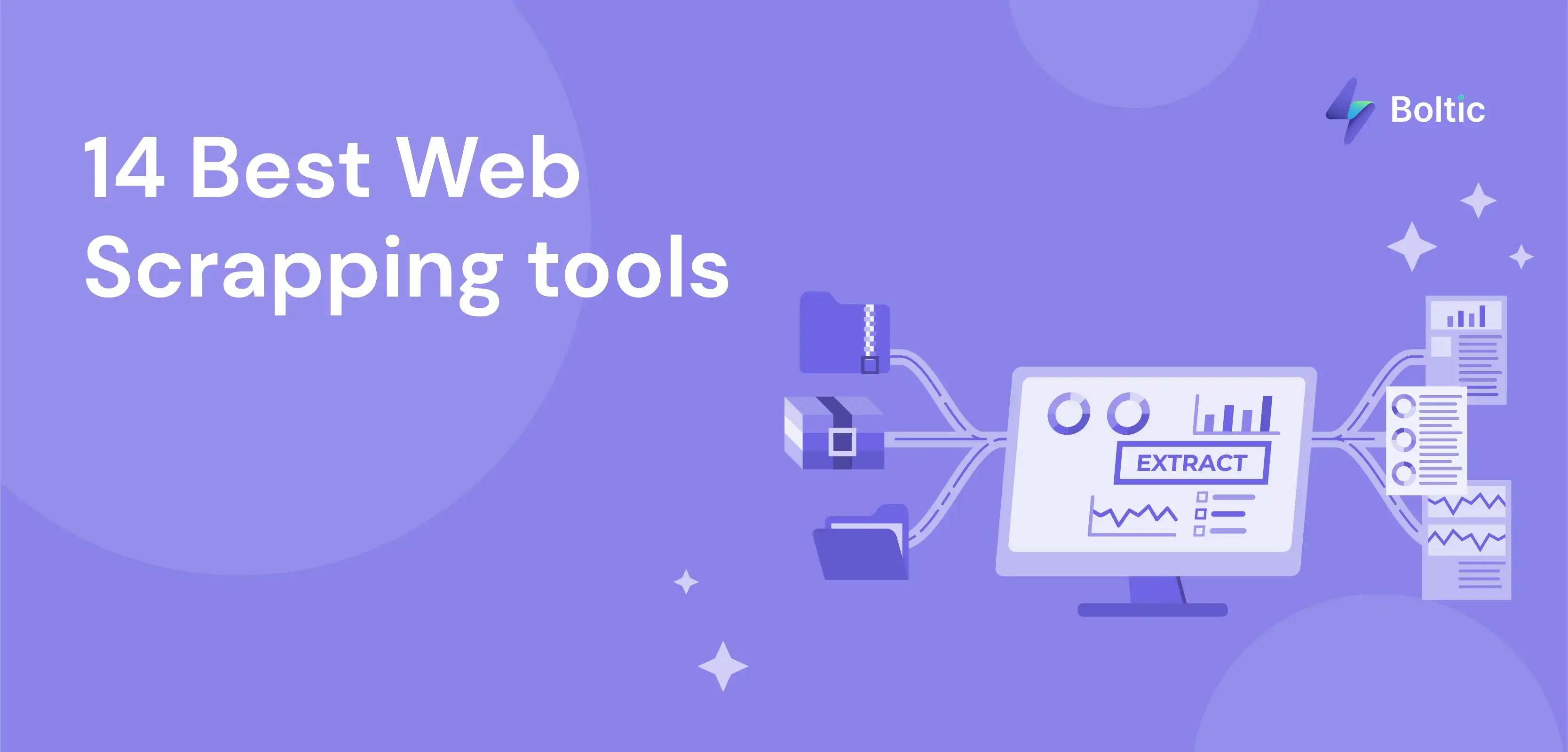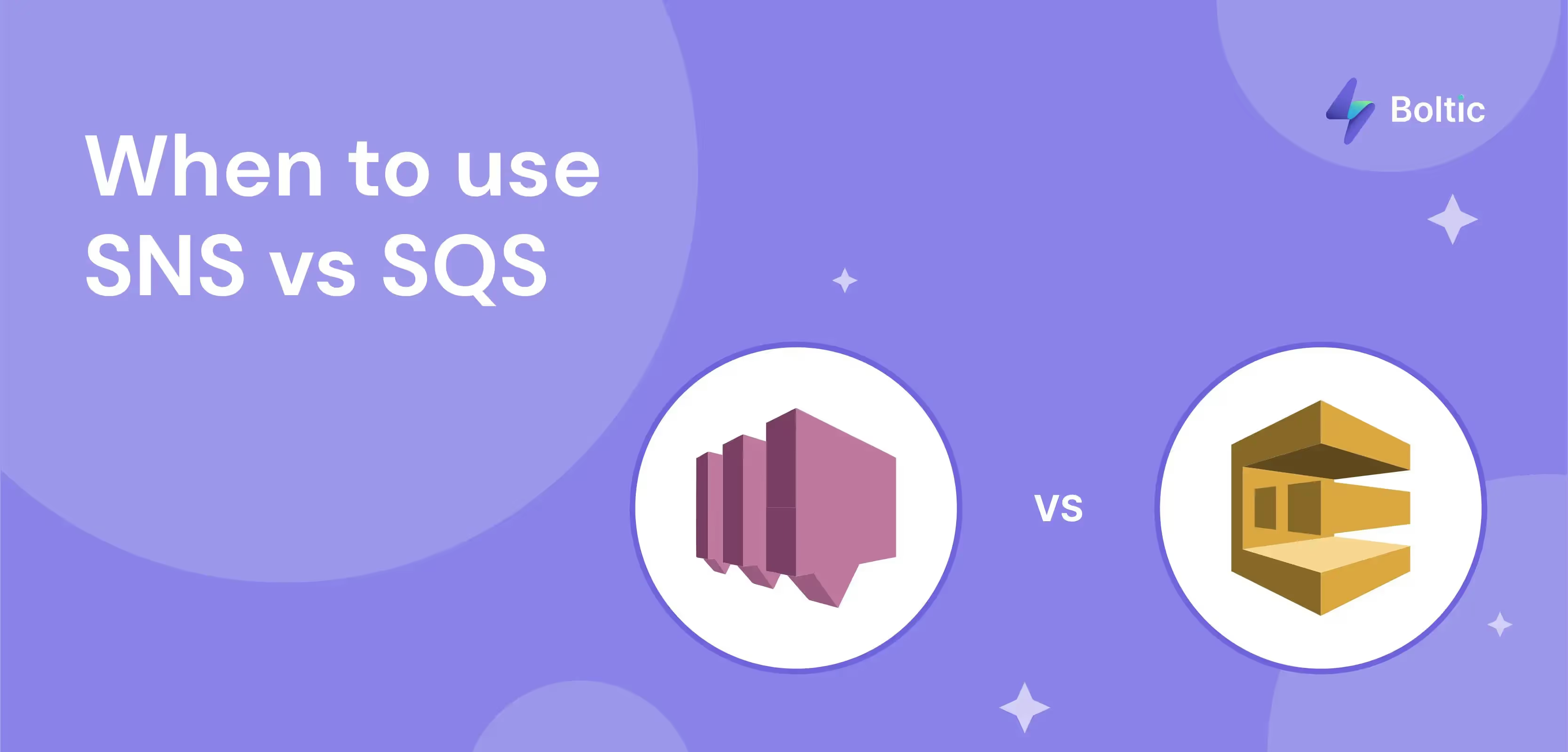As a businessperson, I am pretty sure that there have been instances where you lost a potential lead because you simply forgot to follow up at the right time. I get you. Nowadays, with the evolving market and competition, speed and personalization can make or break the sale. I dedicated the last few months to exploring different CRM tools.
From testing workflows to tracking percentages of real conversion, I found that leads are flowing into most businesses, but they lack proper follow-up systems and thus miss opportunities to convert them. This made me believe that without a good and strong CRM system, most businesses would continue struggling with low conversion rates and may find it difficult to grow.
After conducting deep research and testing, I have finally found some helpful free CRM tools that cater to real sales problems and can help you stay ahead of your competitors. Come, let’s have a look at them.
Top Free CRM Software in 2026
- Vtiger CRM - An all-in-one platform that blends helpdesk, sales and marketing features with AI tools.
- Odoo CRM - Offers business suite features for CRM, accounting, inventory, etc., for expansion.
- EspoCRM - Best lightweight, customizable open-source CRM tool for developers and technical teams.
- Raynet CRM - Has a simple, clean and intuitive interface with a focus on streamlining sales processes.
- Spotler CRM - Great for small-to mid-sized businesses seeking customizable marketing, sales, and managing customer relationships.
- SuiteCRM - Best cost-effective and flexible open-source CRM with extended customizable options and support.
- Zoho Begin - Nice for small businesses looking for multichannel communication and pipeline management features.
- ClickUp CRM Template - Best for startups who want a flexible and customizable template.
- Monday Sales CRM - Ideal for small teams looking for a combination of project management and CRM core functionalities.
- eWay-CRM - Best for contact management and multitasking tools
How did I choose the best free CRM software?
To find the top free CRM tools that can genuinely add value to businesses, here’s what I considered while testing each of them separately:
1. Tested in real-time with active leads - Like most people, I didn’t run behind the features, instead, I chose to test them in real-time with active campaigns. So, my email campaigns were already running, I used CRM software to track email opens, clicks and also conversions.
In this, Zoho Begin was a great one with its seamless pipeline feature for small teams. And for follow-ups, Raynet CRM was an amazing tool.
To filter them, I simply removed those that delayed or lagged during the live campaigns.
2. Easy setup and daily usage - While I was conducting my research, I came across dozens of CRM tools that seemed clean and easy to use. In reality, some of them turned a bit clunky.
That’s where I found the ClickUp CRM Template and EspoCRM. ClickUp’s CRM was too quick to set up everything, while EspoCRM has a great, intuitive interface for an open-source tool.
Like these, I kept some other CRMs on top of my list that were easy to jump into, without long hours of training.
3. AI capabilities and smart automation - While I was looking for some good features and speed, I also touched upon the area of real-time intelligence. Here, what I really meant was features like auto-tagging leads, or notifying us to follow up on a particular lead at the right time.
I was impressed with the built-in AI ‘Calculas’ of Vtiger CRM. This predicted the leads that might ghost me. And yes, the results were mostly accurate.
Another one, Odoo CRM, was also pretty nice. I liked its automation options that helped us streamline repetitive tasks without making us feel overwhelmed.
4. Integrations that bring results - I integrated each of them with the most common business platforms like Gmail, Outlook, Zoom and Slack. I randomly tried e-Way-CRM and was surprised by its ability to work directly within Outlook itself.
Also, I found SuiteCRM to be good with open-source integrations. Tools that required continuous work on the API or actually broke mid-sync were filtered out properly.
5. Free plan that adds value - I remember I sat with a long list of free plans/ open-source CRM tools, and I didn’t know what to do. That’s where I started testing each one of them.
From that list, I found that Monday Sales CRM’s free plan allowed us to use a full pipeline with unlimited contacts. This was fantastic!
Then I came across Spotler CRM. I liked how it offered a nice dashboard and reporting, without even asking for a payment card.
A glimpse of the best free CRM software in 2026
Best CRM Software in 2026 - A detailed outlook
1. Best for AI-based insights
Vtiger CRM (Web, Desktop, Android, and iOS apps)
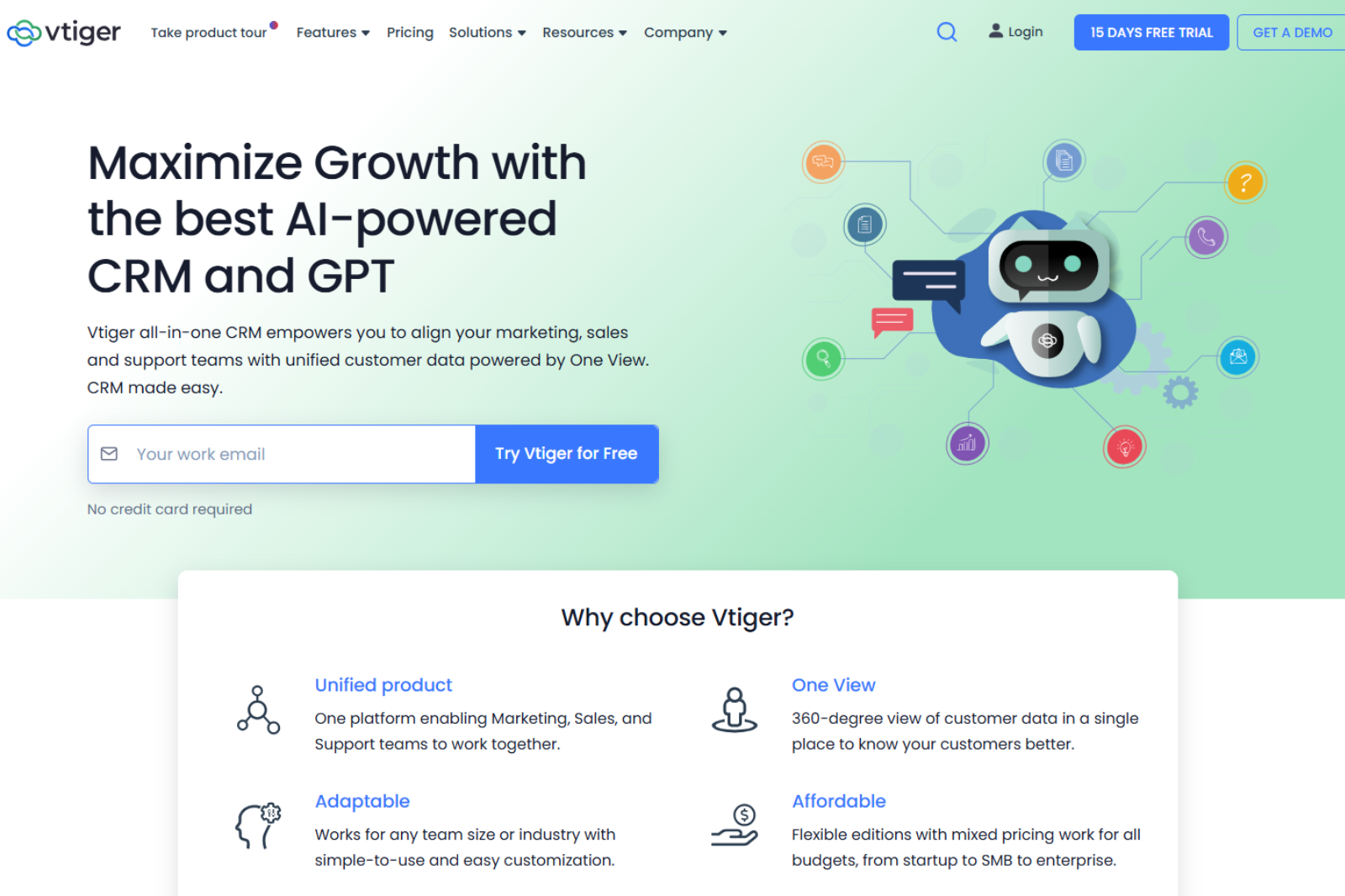
After I personally tried this tool, I found that it is very flexible and all-around, particularly for small-to-midsize businesses. I used its ‘One Pilot’, a free plan, and I was quite impressed with its offerings. It provided access to 10 users and 3,000 records.
I tested many features, such as creating basic email campaigns (up to 1,000 emails per month), the contact management feature, UI summary widgets, and even the help desk ticketing feature. Surprisingly, all these were available in the free plan itself.
Further, I also explored its workflow automation and project tracking features. This was quite helpful in creating operational efficiency. At first, it was a bit overwhelming due to the extensive features and modules such as marketing automation, but I later found it to be good enough.
What caught my attention was its ability to provide customer support, marketing, and sales—all under one roof. Another thing that impressed me was its feature of pipeline automation and calendar integrations.
There, I also found this gem of a feature, ‘telephony integration’. It was very smooth when we synced it with several contacts.
Later, I found that advanced features like detailed insights and predictive analytics were locked in the free plan. But it was fine. Having a small business, we didn’t care much about it.
After testing its web version, we came to test the mobile applications,
We found that they were functional but not smooth enough like its full web interface.
Pros:
- Comprehensive features are offered in the free plan itself.
- An all-in-one platform for customer support, marketing, and CRM.
- Paid plans have decent pricing as per the value offered.
Cons:
- UI may feel a bit outdated in some places.
- It may take a longer time in the beginning to explore it.
- Advanced tools such as deep analytics, lead scoring, and other AI features are mostly locked behind the advanced paid plans.
Free plan - One Pilot (free plan) allows you to create a maximum of 3,000 records, 1,000 emails/month. It comes with basic contact management and other features and can be accessed by up to 10 users.
The paid plan, ‘One Growth’, starts at $12/user/month (billed annually).
2. Best for business-suite features
Odoo CRM - (Web, Desktop, Laptop, Android, and iOS devices)
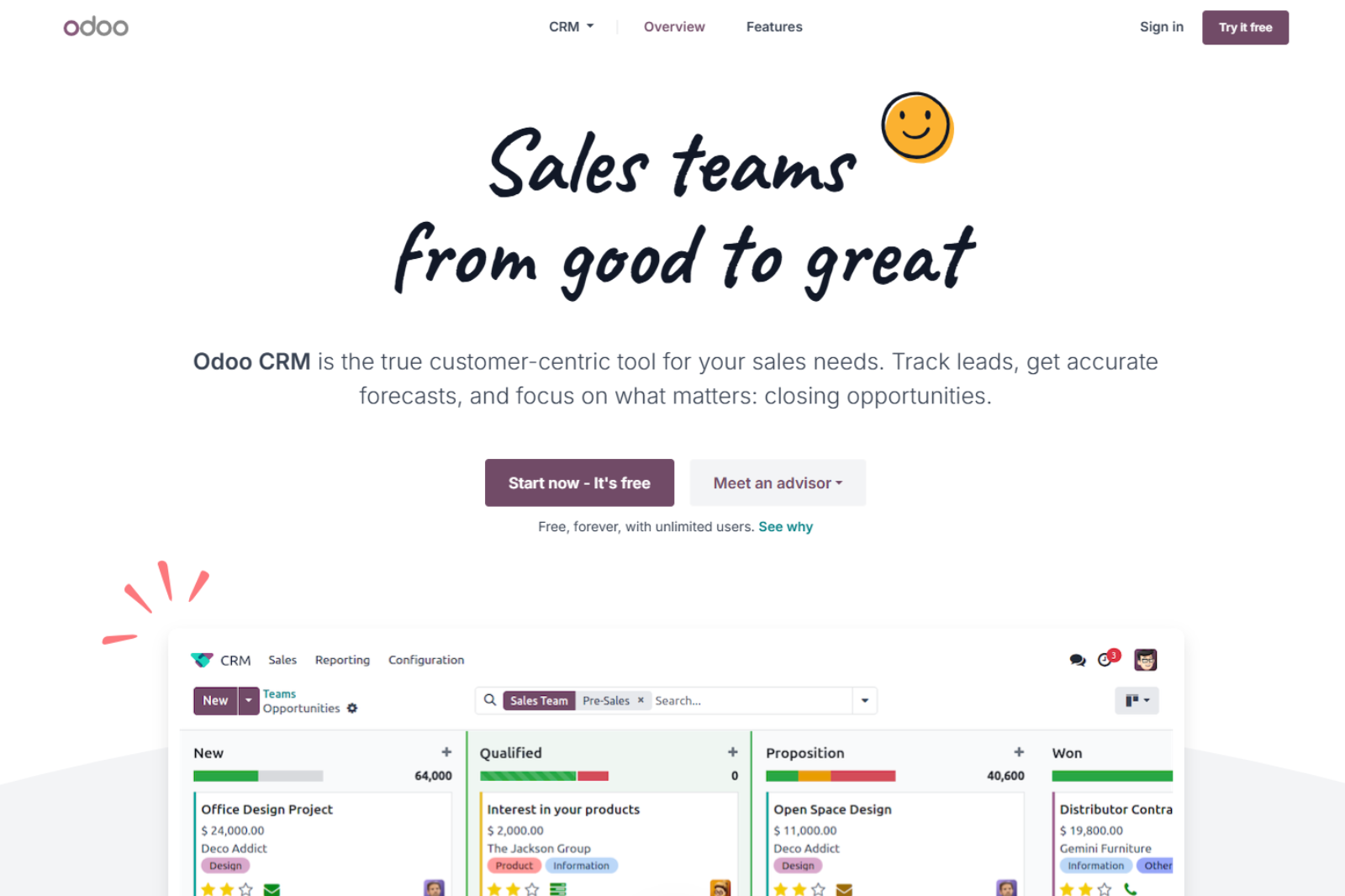
I had heard of Odoo CRM a long time back, but never tested it in real time. This time I did. Initially, I tried its One App Free plan. This was one of the rare CRM software that didn’t restrict the number of users (in the free plan). We could freely access it.
It welcomed us with a clean and modern interface. I was easily able to manage leads, track sales activities, and also schedule follow-ups swiftly.
Its drag-and-drop pipeline was quite intuitive, and the smart filters offered a clean and clear picture of sales activities.
Although the free plan is great with no restrictions on the number of users, it has some limitations that you must be aware of.
Advanced features like marketing automation, detailed automation, and integrations with Odoo apps were locked in the free plan. To access them, a subscription to its paid plan is required.
We also noticed that this free plan (self-hosted) is hosted on Odoo Online and offers decent storage up to a 100 MB limit. This is suitable for small businesses.
I even tried subscribing to its paid (Standard) plan. With this, I was able to use many different Odoo applications for Project, Inventory management, and Accounting. This made it really easy to create a connected workflow across all the areas of business operations.
Thus, even though it can be a bit expensive for small teams, it was definitely worth giving a shot.
Pros:
- This is modular and even scalable in nature. You can start with a free plan and expand as you go.
- Has an intuitive design with a drag-and-drop pipeline and smart filters.
- This community edition of Odoo allows for self-hosting and customization.
- You can simply access all its applications with a starter paid ‘Standard’ plan at just $24.90/user/month (billed yearly).
Cons:
- Under a free plan (Odoo - Community Edition), you cannot access more than one application without advanced features.
- The official mobile application is only available with Odoo CRM paid plans.
- Technical assistance may be required to set up and customize.
- This primarily integrates well with Odoo applications. For third-party integrations, you may require additional development.
Free plan - Access to unlimited users to a single application. It is hosted on Odoo Online and offers up to 100 GB of storage.
The paid ‘Standard’ plan starts at $24.90/user/month (billed annually).
3. Best lightweight and customizable open-source CRM
EspoCRM - (Web, Desktop, Android, and iOS)
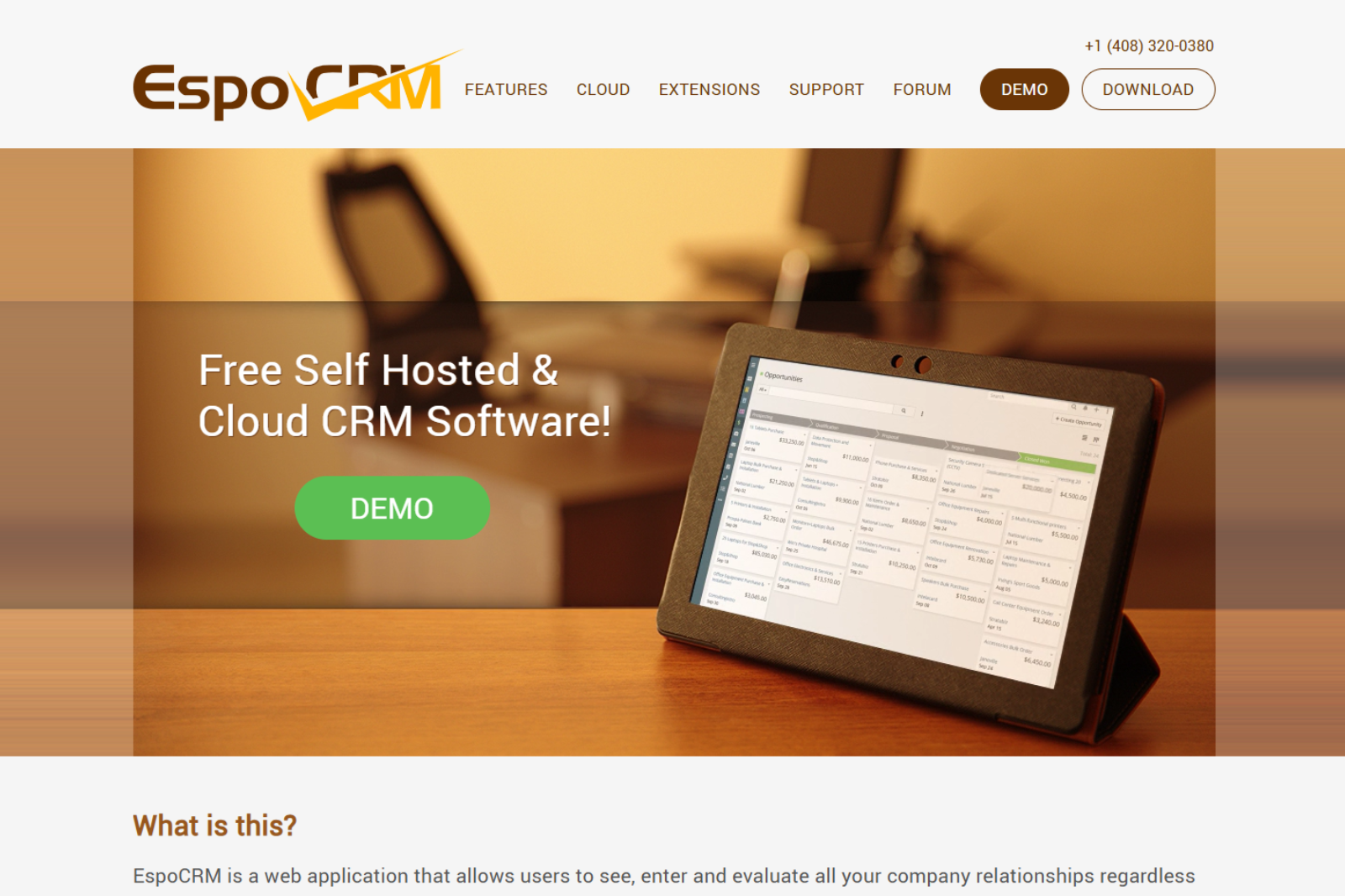
I tested a self-hosted version of EspoCRM. It is an open-source platform that offers an entire CRM suite with features without a record or user limit.
The interface was quite clean and simple. It helped me to manage several contacts, leads, and other opportunities effectively. It also had a drag-and-drop sales pipeline and customizable dashboards that were truly amazing.
I also liked its built-in calendar feature and task management tools that were great at tracking follow-ups and organizing different schedules.
One of the best features was its Entity Manager. This helped me to quickly customize fields, entities, and even client relationships as per my business needs. This type of customization was highly useful when we were tailoring the CRM to our different workflows.
Also, the effectiveness of the Marketing Automation was amazing. It genuinely helped us to create targeted email campaigns and track their performance. Besides that, the ability to manage different cases and launch a self-service customer portal was super nice to improve our customer support.
Using all these powerful tools didn’t make me feel like I was using a free CRM tool. But integration with third-party applications was not as simple and seamless. It required custom development.
Also, advanced reporting and analytics were somewhere limited, and thus, it might not be suitable if you need deep analytics.
Pros:
- Offer highly customizable features to cater to different business needs.
- Does not provide any restriction on customer records or user limits.
- Has the ability to self-host and even modify the codebase.
- Provides wide-ranging features like sales pipeline, marketing automation, etc.
Cons:
- Custom development is required for integration with third-party applications. This can be time-consuming.
- Technical expertise may be required for advanced configurations.
- Does not offer any native mobile applications. It is accessible via a web interface.
Free plan - Since it is open-source, it is completely free with no user or record limits. It offers an array of features like marketing automation, entity manager, etc.
For cloud-based hosting or add-ons, you need to request the EspoCRM team, and they will guide you regarding everything.
4. Best for streamlining sales processes
Raynet CRM - (Web, Desktop, Android, and iOS apps)
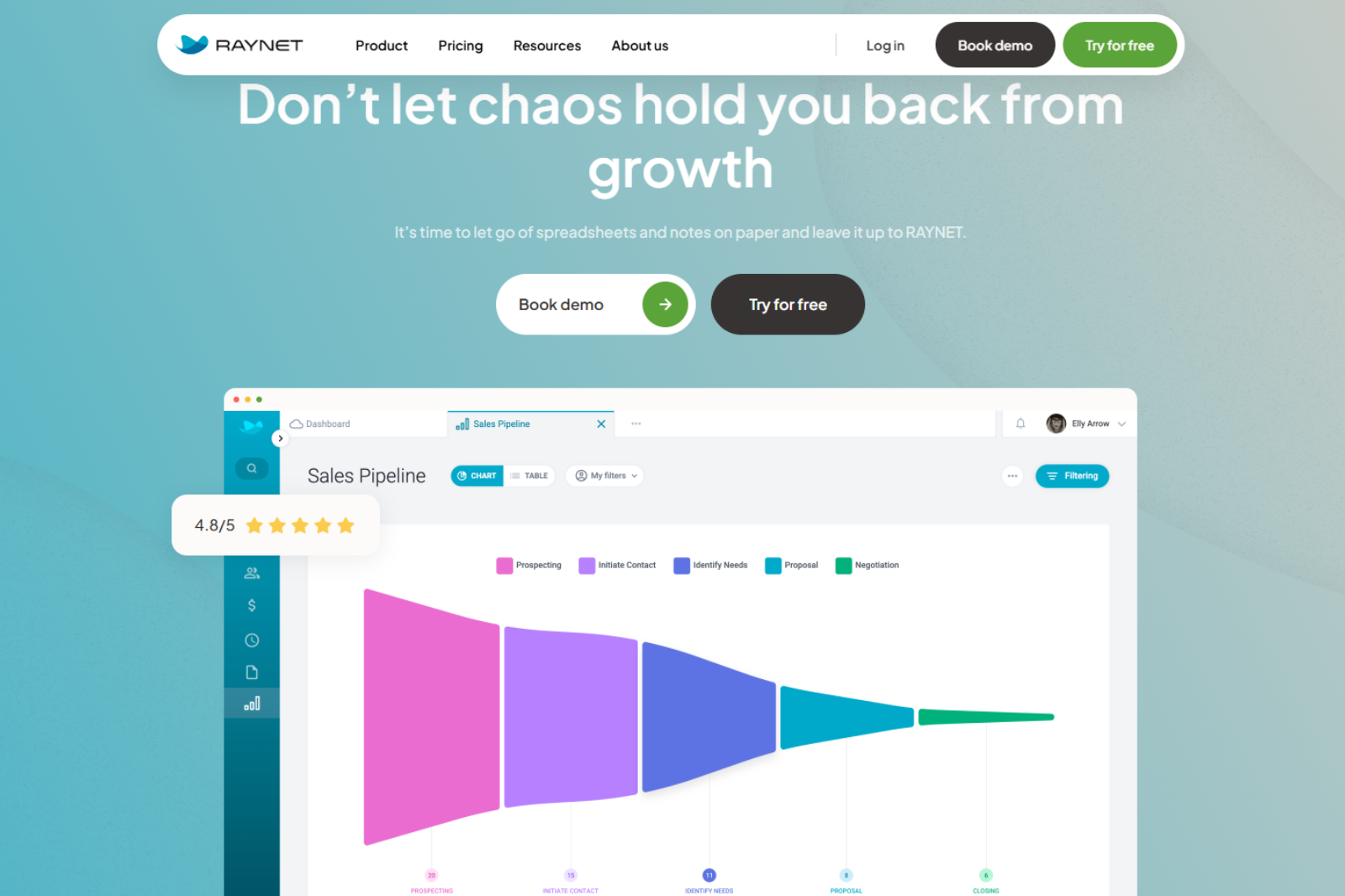
Want to increase your sales conversions? Raynet CRM is a must try. It is a cloud-based platform that can help you streamline your sales processes.
With its 30-day free trial, we started exploring this platform. Its navigation bar was simple and quite straightforward. We were able to quickly try its rich features.
Then we tried performing essential tasks like managing leads, contacts and deals. Raynet handled them well.
In the area of customization, we saw its dashboards and sales pipelines. These provided better insights and helped us improve our sales performance quickly.
The most noteworthy part of this platform were its mobile applications (available for both Android and iOS). These apps performed well on the go.
They helped us view and edit contacts, manage leads and even schedule sales activities smoothly.
In addition to this, we also explored many task management and built-in calendar features. They were quite smooth at organizing follow-ups and schedules.
Then, we came to its most unique feature, Business card scanning with a note-taking tool. Our on-field sales teams used it, and these were truly amazing.
After that, we came across its calendar and dashboard views feature in its mobile application. Similar to a desktop interface, it performed smoothly and also synced beautifully.
This platform integrated with platforms like Integrately and Zapier. We later connected it with Google Workspace and interestingly it worked well with it too.
Later, we found that it works well with other famous apps like Outlook, Mailchimp, and a lot more. This gave us complete flexibility to connect it with different apps to sync data and automate workflows easily (without technical support).
Pros:
- Seamlessly connects with popular third-party applications.
- Has an intuitive interface and simple navigation.
- Offer a mobile application to perform sales tasks on the go.
- Has customizable dashboards to tailor views and even monitor KPIs in a better way.
Cons:
- Advanced features like SSO and AI-based insights are only available in paid ‘Professional and ‘Enterprise’ plans.
- For advanced configuration, technical knowledge is required.
- If your business relies on detailed reports, then additional customization may be required.
Free plan - It does not have a free plan. Instead, it offers a 30-day free trial on all its paid plans with full access to its features. After the trial ends, the paid plan starts at $19/month/user (billed annually) for up to 3 users with limited features.
5. Best all-in-one platform for customer relationship, sales, and marketing
Spotler CRM - (Laptop, Desktop, Tablet, Android, and iOS)
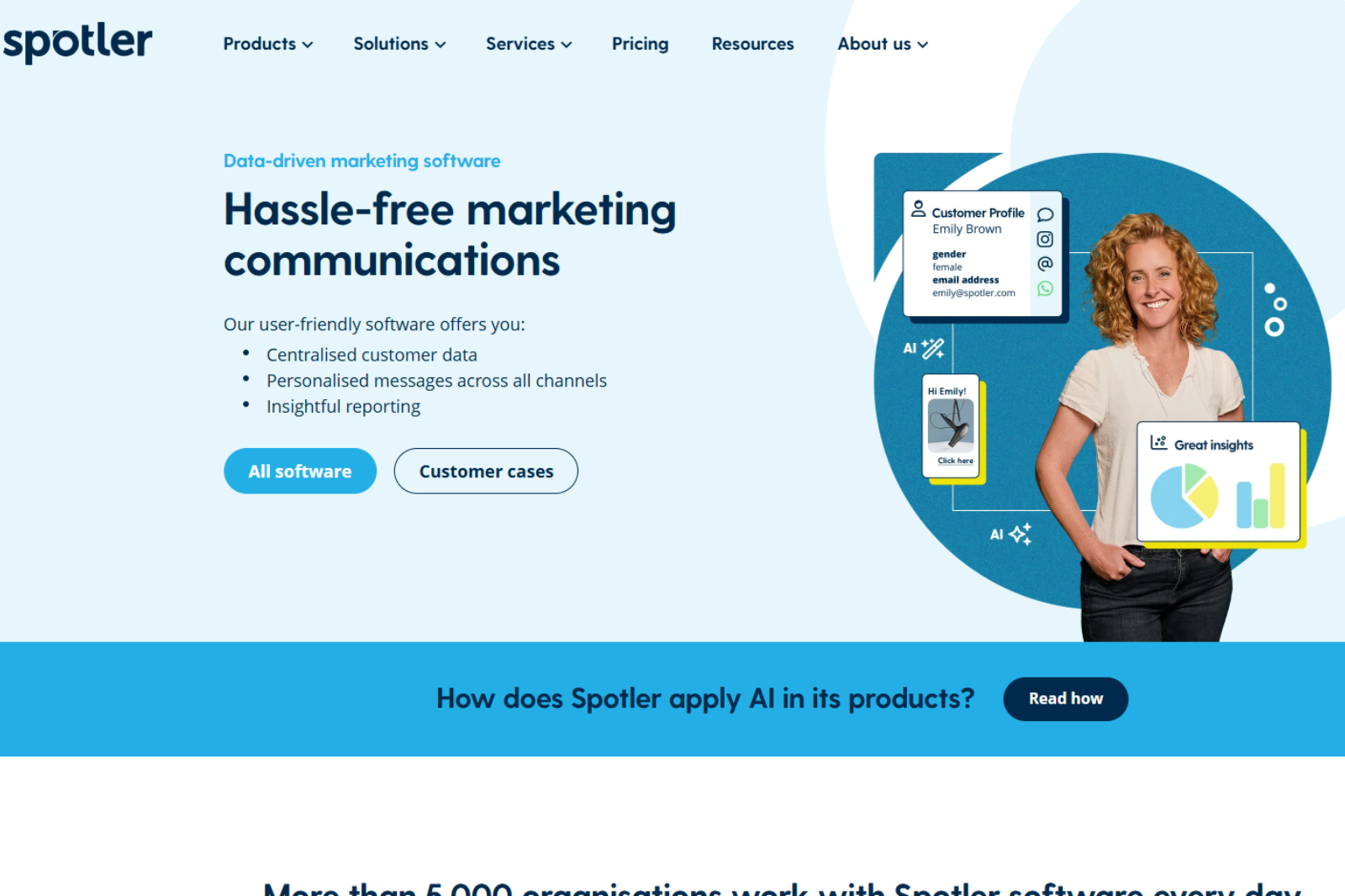
Spotler CRM was amazing with its clean and easy-to-use platform. It beautifully combines the features of sales and marketing for B2B teams.
With a minimal setup, we could easily look up for managing contacts, tracking leads, and automating workflows.
Integration with email marketing tools was quite handy and simple. Also, running personalized campaigns was way easier within the CRM itself.
It even has a feature of ‘score leads’, which helped us to prioritize leads by assigning numerical values based on the potential of converting.
Also, customization features were simply impressive. With customizable fields, dashboard, and pipelines, we were easily able to work around it and use it as per our business needs.
My team liked its 360° customer view, which smoothly kept all activities and communication in one place.
Even though its free plan was smooth and ideal for small teams (2 users, 10MB of data storage, and 100 company records), its advanced features like detailed reporting and extra storage are available in its paid plans.
Also, I found that it is only accessible via web browsers and phones. It does not offer its mobile application.
Pros:
- Within the CRM itself, it allows for managing email campaigns and lead-nurturing tools.
- Provides access to the full history of customer interactions.
- Customizable dashboards help to tailor reports and views to monitor important metrics.
- Has a user-friendly interface. Thus, it can be quickly set up and used.
Cons:
- Advanced features like marketing automation and detailed reporting are only available in paid plans.
- A dedicated mobile application is not available yet.
Free plan - The free plan includes 2 users, unlimited contacts, 100 company records, 100MB document storage, limited API integration, custom reports, contact management, sales automation features, etc.
The paid ‘Starter’ plan starts at $14/user/month. It offers 1GB document storage, two-way MailSync, and other advanced features.
6. Best cost-effective open-source CRM for extended customization support
SuiteCRM - (Web, Desktop, Android, and iOS apps)
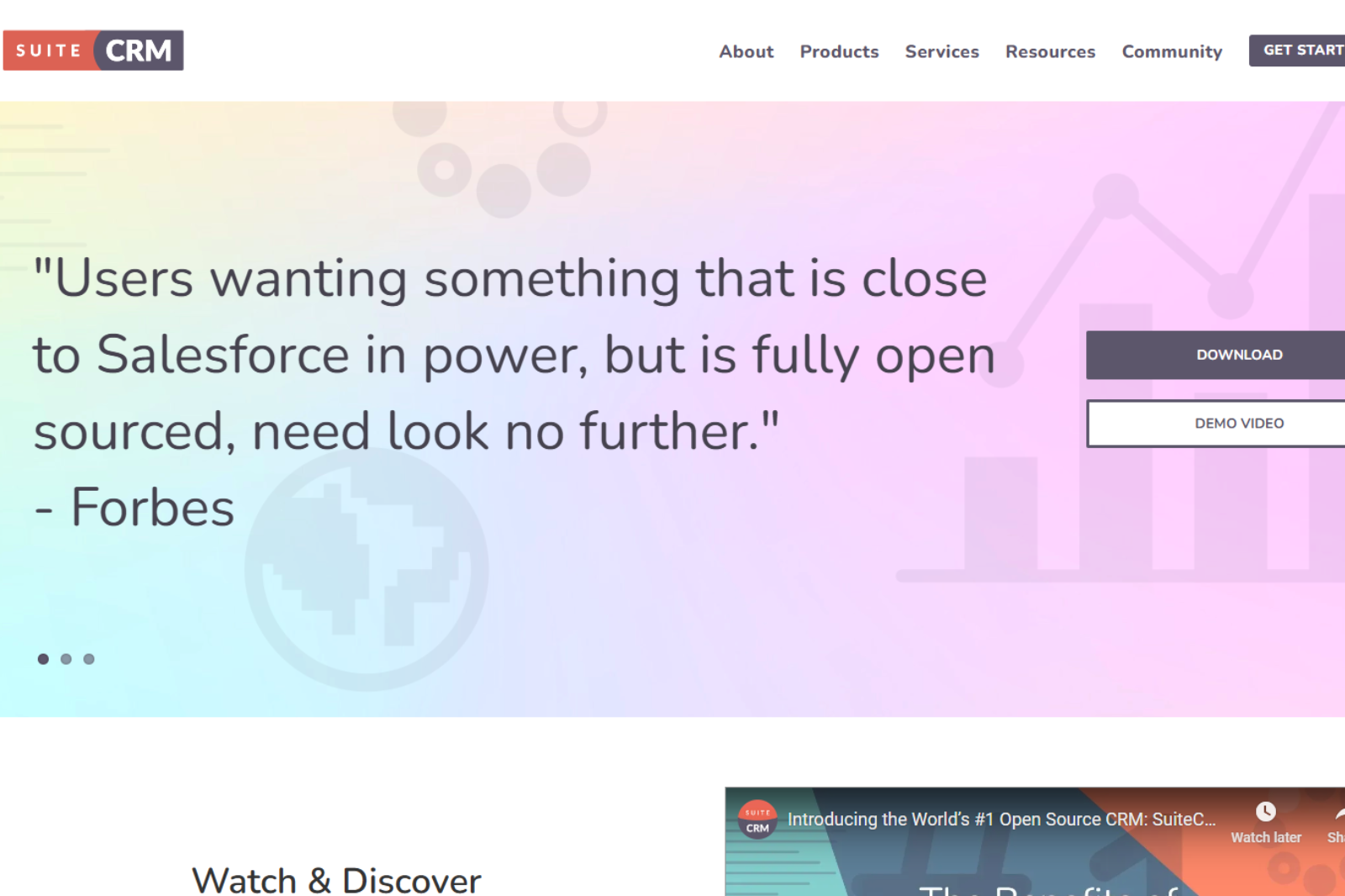
If your business involves deep customization and demands full control, then you must try SuiteCRM. It is one of the most powerful open-source platforms.
This software caters to different areas of CRM, like marketing, sales, and support. The best part is that it doesn’t even charge any licensing cost.
After I tested it further, I found that it is great for enterprise-level businesses that require CRM functionality at an affordable cost.
Later, I came across its customizable features. From customizable modules, fields, reports, and workflows, everything was fine and fitted well in our unique business processes.
The 360° customer view feature perfectly organized every interaction and deal. But the interface was slightly outdated compared to other tools.
If you have a technical team, it would pave better results with great scalability and full control.
Pros:
- All-in-one platform that offers marketing, automation, case management, and customer support features.
- It does not charge any licensing fees with the free, self-hosted version. Thus, for budget-friendly teams, this can be a great choice.
- Tailor fields, modules, reports, and even workflows to match your business needs.
- It has an active community for plugin support and regular updates.
Cons:
- To run the free version, you need your own server, maintenance, and updates, unless you subscribe to its paid hosted plan.
- For third-party integrations, additional development or third-party tools may be required.
- The UI is a bit outdated compared to modern CRM platforms.
- Requires technical know-how for deep customization and setup.
Free plan - It includes marketing, sales, and customer support tools, standard reports, and visual dashboards, workflow automation, various customizable tools, and REST and SOAP APIs for third-party integration.
For advanced features, you may look forward to its paid plans upon request.
7. Best affordable CRM solution for managing sales pipeline
Zoho Begin - (Web, Android, and iOS)
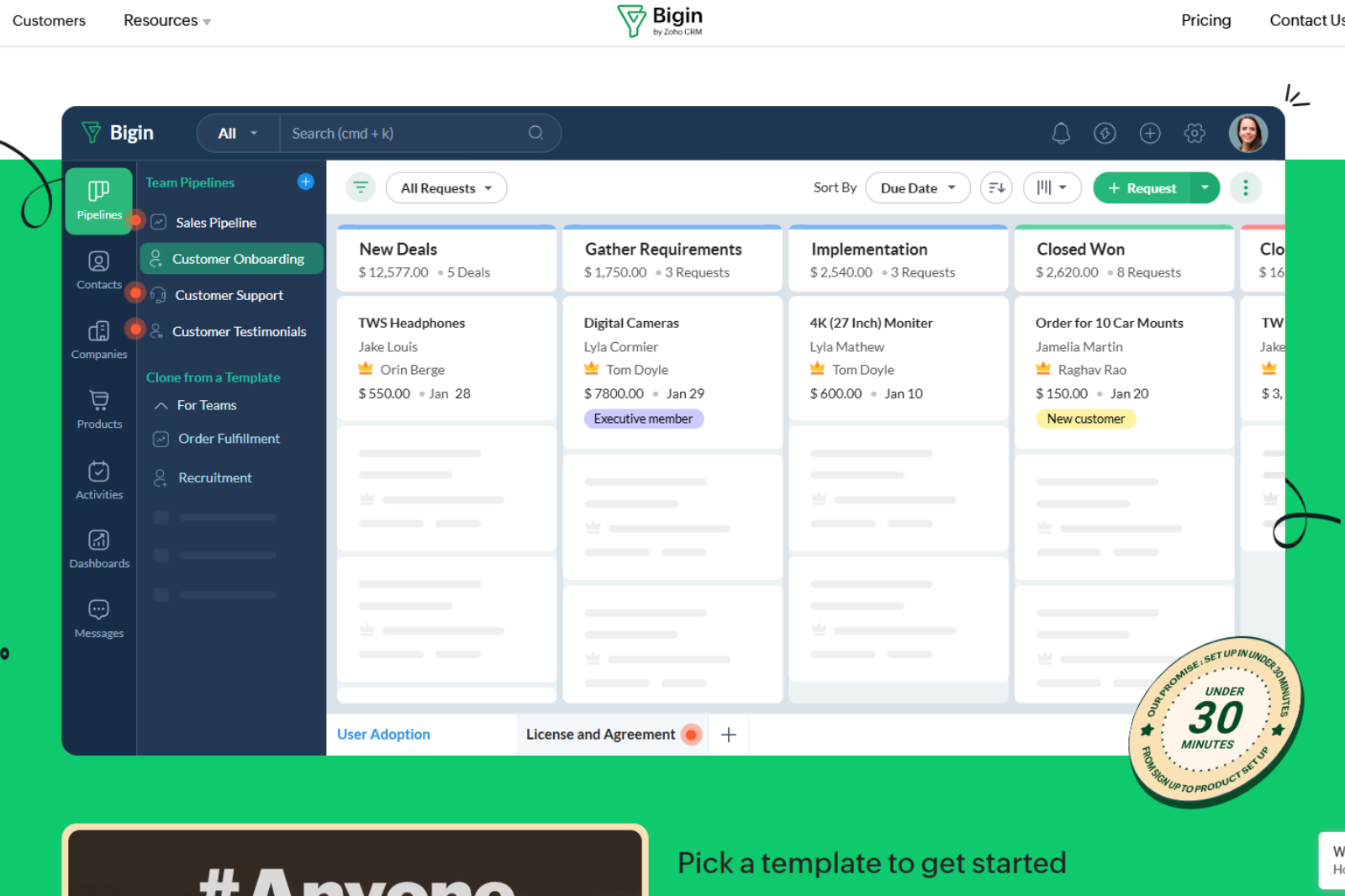
After testing complex CRM platforms, I came across this interesting tool, Zoho Begin. As someone who is mostly into small businesses, I liked how it was simple yet capable enough to fulfill my business needs.
With quick and easy setup, we swiftly created sales pipelines, contacts, workflows, and made them live under 30 minutes. Without any tutorials or help, it made the process hassle-free.
Also, its interface was quite simple and sleek. With its fantastic responsiveness and functionality, we could easily perform different tasks.
What blew my mind was its pipeline-centric design. This helped me to build different sales pipelines with custom stages easily. With this quick process, it became very easy to visualize and manage various sales flows effectively.
In addition to this, its built-in telephony feature was noteworthy, It helped us to make and receive calls directly inside the CRM platform. Without putting in manual efforts, all the call logs were saved automatically.
Also, for organizing everything, notes, emails, and calls, put things in the right place, and help us give a quick overview of all the customer interactions.
Pros:
- It can be easily set up in under 30 minutes without any training.
- Offers visual sales pipelines for easy and effective sales tracking.
- You can make and receive calls within the CRM platform itself.
- If you are already using paid plans of Zoho, it will be better for you to use this tool.
Cons:
- Not suitable for advanced automation or large third-party integrations.
- Does not provide ample flexibility compared to robust CRM tools.
Free plan - Provides access to a single user with one pipeline, 500 customer records, rich features like built-in telephony and integrations with Zoho Campaigns, Zoho Desk, and Zoho Forms.
Its paid plan ‘Express’ starts at $7/month/user (billed yearly). You can try them with a 15-day free trial too.
8. Best for startups looking for customizable and flexible templates
ClickUp CRM Template - (Web, Desktop, Tablets, Android, and iOS apps)
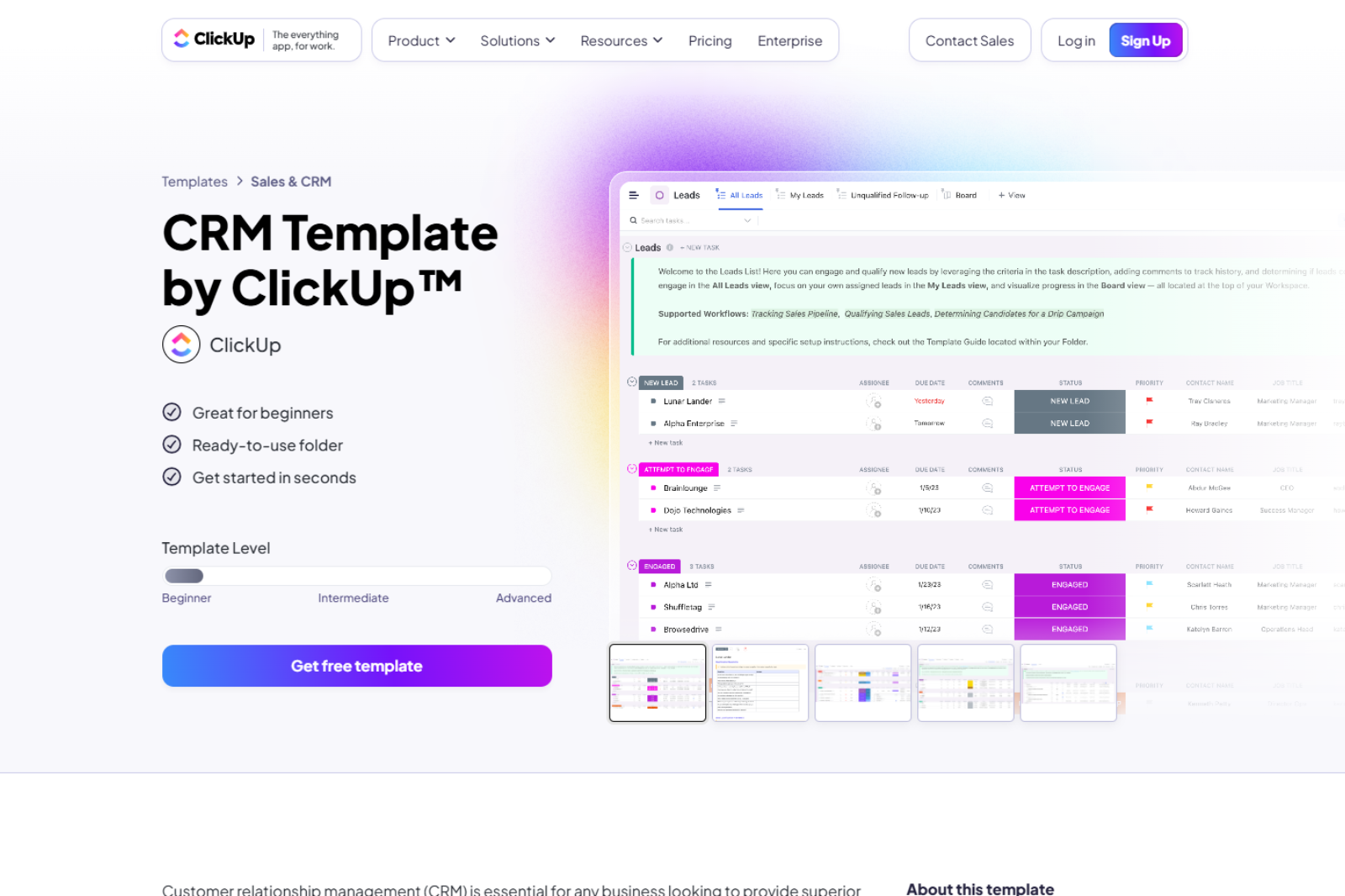
Using this platform was pretty fun. With the ClickUp CRM Template, we seamlessly integrated CRM functionalities directly with the project management environment.
By keeping everything under one roof, I was able to manage the workflow with a better timeline.
As we started using it, the setup was quick and very straightforward.
We saw that its template was filled with predefined custom fields like contact information, deal stages, and industry types. This made our job simpler to add information as per our business needs.
As compared to sales-focused CRM tools, this tool even has a visual sales pipeline to track leads and opportunities with ease. We were able to swiftly switch between calendars, lists, and board view effectively.
Later, we saw that it can even automate certain tasks. We begin with our routine tasks, such as setting follow-up reminders and updating statuses. Where these tasks involve a lot of back-and-forth, we could simply automate them.
In terms of integration, we were able to integrate email communication with this tool. This made client interactions 2x faster, without any chaos.
Pros:
- If you are already using ClickUp for project management, it would be easy and highly efficient for you to use this CRM tool.
- To cater to your sales needs, it easily tailors custom fields, deal stages, and even contact information.
- With its built-in automation tools, it allows you to set triggers for task assignments, status changes, and follow-ups.
- Allows you to quickly switch between Calendar Views, Board, and List to visualize deals.
Cons:
- Does not offer in-depth analytics and reporting unless you create custom dashboards manually.
- It is a CRM template, not a comprehensive suite of CRM suites. So, advanced CRM-based features such as email tracking and lead scoring may require additional integrations or setup.
- Does not automatically sync with email systems and external contacts by default.
- If you are a first-time user of ClickUp, some features can be a little overwhelming.
- Does not offer any native mobile application like other CRM tools.
Free plan - ClickUp’s forever-free plan includes access to its CRM template, up to 100MB storage, and unlimited tasks. With this, you can easily create pipelines, automate different workflows, and even collaborate with unlimited members.
9. Best for small teams seeking a blend of project management and CRM solutions
Monday Sales CRM - (Web, Desktop, iOS, and Android apps)

Exploring this tool was a great experience. It has a pretty intuitive interface that can simplify all the tasks, such as managing contacts, deals, and leads.
It offers customizable sales templates and pipelines. This made our job easy to align with specific sales-related processes.
We also saw how smoothly it helped us to switch between different types of calendars, Kanban, views, and also timeline. This helped us a lot to track things seamlessly.
In the area of automation, it has some special features that let us update deal status, streamline routine tasks, and even set follow-up reminders quickly.
But, as the free plan offers limited features, its exceptional features, like AI suggestions (Pro+) and two-way email integration, require a subscription.
Overall, if you own a small business, this can be a great fit.
Pros:
- Offer customizable pipelines to tailor sales stages
- Visual dashboards with multiple view options are good for better tracking and management of leads.
- Allows connection with many tools to centralize operational activities.
- It can automate routine tasks smoothly.
Cons:
- Advanced features are locked in the free plan.
- If you are a new user, you may find it a bit difficult to navigate initially.
- The free plan offers limited storage of up to 500 MB and restricts the number of users.
Free plan - It provides access to up to 2 users. Offers 3 boards for organizing data and tasks, 200+ templates for different industries, and other features. It also offers 500 MB of storage and access to its mobile application (iOS and Android).
The paid ‘Basic’ plan starts at $12/user/month (billed annually).
10. Best for contact management and multitasking tools
eWay-CRM - (Web, Windows, and Mac with Outlook 365, Android, and iOS)
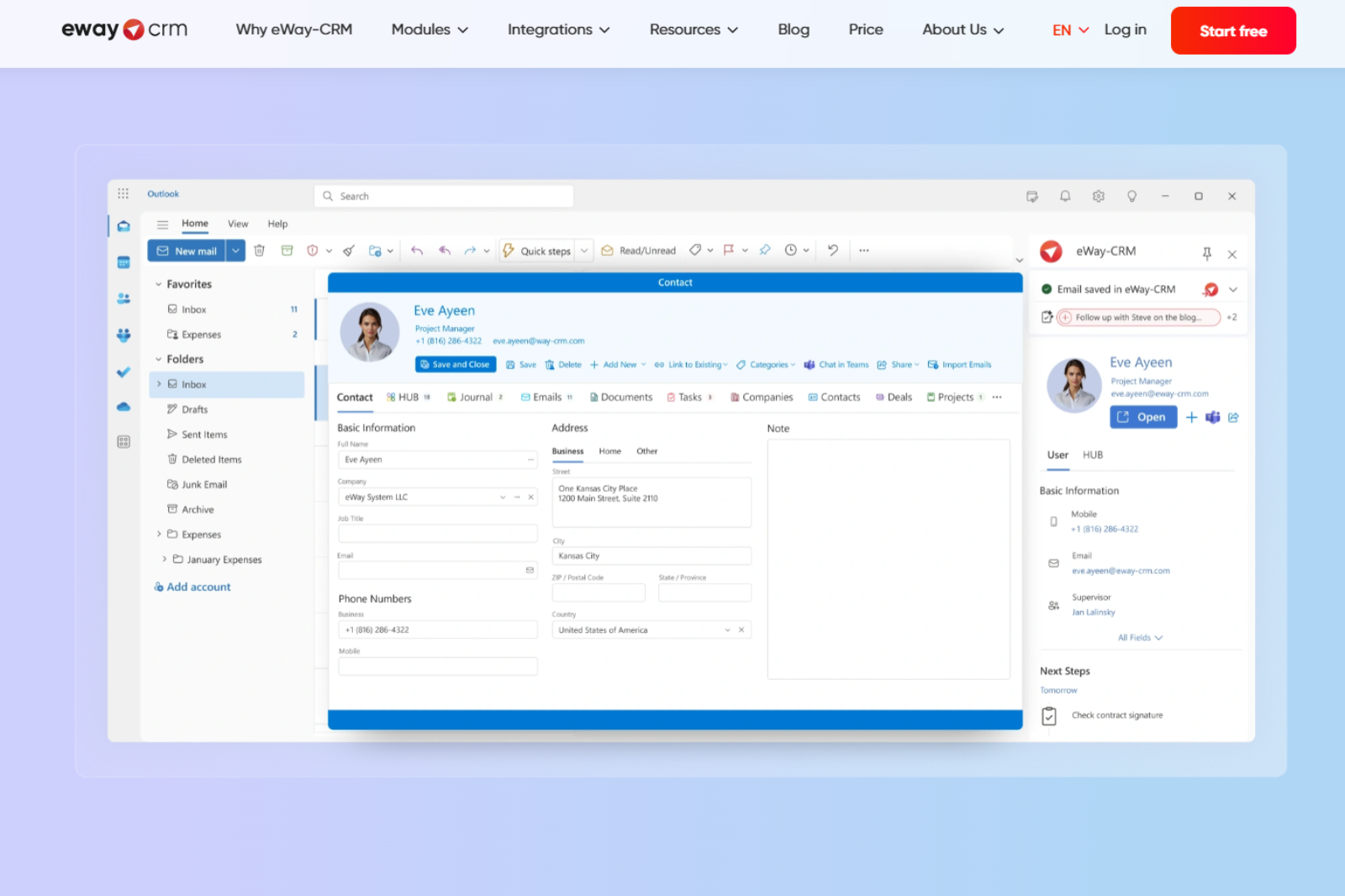
If you are someone who often relies heavily on Microsoft Outlook, then you would love this software. Being a Microsoft Outlook user, I felt that the integration with eWay-CRM was very smooth.
Since this tool is built directly into Microsoft Outlook (desktop version), eWay-CRM allowed me to manage contacts, projects, follow-ups, and deals within my Outlook itself.
This minimized our efforts to switch between different tabs and streamlined everything under one roof. To access this eWay-CRM, a subscription to the Microsoft 365 plan is mandatory.
I also liked its entire modular system. We could easily turn off the modules that weren’t required, and make everything simpler.
In just one click, it had some features that easily converted emails into leads or projects. This was super smooth.
But we saw that some advanced analytics and automation tools were only available in the paid plans (Standard, Plus, and Enterprise).
Thus, if you have complex business needs, an upgrade to its paid plan is necessary.
Pros:
- Best for Microsoft Outlook users–it runs inside that application.
- It has a modular system that allows you to activate features only when they are needed.
- With just one click, it can instantly turn email into tasks or deals.
- Provides accessibility to its Android and iOS applications.
Cons:
- You need a desktop version of Outlook to use eway-CRM. (For this, a subscription to Microsoft 365 is required.)
- Provides limited storage of 200 MB, which may not be suitable for larger teams or businesses.
- If you are new to using Outlook-based CRMs, it may take time to master this tool.
- Advanced features like detailed reports and custom workflows require subscription to paid plans like Standard, Plus, and Enterprise.
Free plan - Provides access to unlimited contacts and users with core CRM modules. It also offers 200 MB document/email storage, Outlook (desktop) integration, basic tools such as custom fields and workflows and access to its mobile applications (Android and iOS).
The basic paid plan ‘Lite’ starts at $20/user/month.
Which free CRM software has the best feature?
Use cases of CRM software
In case you are wondering about the applications of the above-listed tools, here are the use cases that can help you.
- Service-based consultants and agencies - As I used Raynet CRM, its visually-appealing and simple dashboard seemed better for freelancers, small agencies, and even consultants. I liked how it was able to quickly set up follow-up actions and client stages.
But if you are looking for a CRM tool to scale teams, then this may not be the right choice as it lacks advanced automation features.
I also found Spotler CRM (formerly Really Simple Systems) to be amazing for B2B-based service companies. They are great for managing email marketing and sales pipeline under the same roof.
To check, I tested its automation speed for email follow-ups, and I found it helpful and worthwhile for small B2B companies. The only concern is that it does not have a mobile application yet, and the UI can be a bit outdated.
- SaaS and Tech startups - Vtiger CRM was pretty good at offering AI-based insights and sales automation. It had all the features for scaling Saas-based businesses.
Even though it took a little extra time to set up and onboard teams initially, its Calculus AI was worth the time and helped us to predict the leads that can easily drop off (not every CRM tool can do this).
With that, I also found SuiteCRM to be on the same page. This is an open-source tool, but it is quite powerful for startups and enterprises that demand full control. You need a technical team to work around it, but it was amazing. It offered full flexibility when we tested its workflow rules and API integrations.
- Construction and Manufacturing - Odoo CRM (Community Edition) fits perfectly in this category. As we tested, we found out that it is well-fitted for industries that want operational and CRM assistance.
It has CRM as well as features for inventory management and billing. If you are not using Odoo’s full suite plan, then you may not find CRM features alone to be sufficient.
- Creativity-focused startups - ClickUp Startup Template was simply great at turning a simple list of leads into a lead pipeline, within a few minutes. This makes it more helpful for lean teams that focus more on creativity and innovation.
If you are someone who is already using ClickUp for task management, this tool can help you make the most of it.
Before you explore it, let me tell you that it's not a real CRM tool, specifically. It does not have native sales tools. So, you need to build everything from the start, which can be time-consuming.
- E-commerce and Retail - For this area, I found Zoho Begin to be truly impressive. This is a perfect fit for small startups and e-commerce businesses that require a mobile-friendly lead tracking system with basic automation.
We used it to handle promo leads and also tried converting visitors from a landing page. And, it was smooth enough without making us feel overwhelmed.
In the area of reporting and customization, it has limited features. If you need advanced features and integrations like Shopify, you need to upgrade to its paid plans.
- Sales-heavy businesses - To carry out heavy sales-based tasks, I found Monday Sales CRM to be great. It offers a free plan that is sufficient for small sales teams. It involves visual sales pipeline features and some automation features.
Even though it does not offer ample tools to cater to large sales teams, the experience was nice. The free plan has limits on integrations, automation and activity logs. These logs tend to get over easily as you scale.
We used it with 4 reps, and it surprisingly handled deals, tasks, and even client updates beautifully, without asking us to download or rely on any extra tools.
- Custom use for developers - If you are a developer or a tech-savvy person, you must try EspoCRM. This is great if you want to modify or host a CRM on your own.
We tried its features for customizing logic and fields. It was flexible, fast and light.
But, it is not for beginners and does not offer mobile app support. Also, the UI can make you feel a bit outdated.
- Professional services sector (Finance, Law and Consulting) - If you are a business professional in the area of Law, Finance, etc., eWay-CRM can be your go-to tool, especially if you mostly use Outlook.
From email tracking to lead notes, it keeps everything in one place. With this tool, we didn’t have to juggle between different tabs.
This works on Windows as well as Mac users with Outlook. It is compatible with both Outlook with Mac and Outlook Online, which is under Microsoft 365. It runs inside Outlook on the web, mobile, PC and Mac. To access it, you need a subscription to Microsoft 365.
Not-so-popular free CRM software
After testing many CRM tools, here are some of the not-so-popular ones that are so hyped, but are worth exploring because of their utility.
1. Streak CRM - If your business relies on Gmail, this can be a great tool for your daily productivity. It can organise your contacts, notify you when someone opens your email, and also manage your sales pipeline effectively.
It performs all these tasks within your Gmail inbox, without asking you to open an extra tab. The best part is that you can use basic automation tools and some CRM features in the free version itself. This way, you can test it better without subscribing to it.
2. Capsule CRM - This is one of the best tools with a simple, minimal UI that focuses on the core business needs. It has a great contact management system, a very simple sales pipeline and a pack of light customisation features.
It offers a free plan that is limited to 2 users and 250 contacts. This is fair enough for freelancers and small startups.
Even though it does not offer advanced tools, it surely makes the newcomers comfortable and focused.
3. Flowlu - This is truly a hidden gem. It is a unique CRM software that blends various business tools, such as knowledge systems, invoice and task tracking. I genuinely liked how it managed projects and leads in one single place, without asking me to download any separate applications.
With a clean interface, its free plan offers necessary CRM features and can be used for up to 2 users. So, I think it's a great choice if you are running a small business.
Upcoming trends in CRM - You must watch out for in 2026
CRM trends are not just a catch, but a real shift. After I started testing CRM tools at the beginning of 2026, here are some trends I saw coming.
1. Fast automation - After testing Zoho CRM, Freshsales, and Pipedrive, I feel the automation is not temporary but behavioural. Using such tools, I saw how different sequences adapt depending on whether a ‘lead’ visits a web page or opens an email.
Here, the CRM simply modified the steps without making any manual changes. You just need to set it up once, and it works smoothly and intelligently based on the behaviour of the leads.
2. AI-based insights - Gone are the days when CRM systems were used as storage systems. It’s 2026, where tools like Salesforce and HubSpot are designed to cater to your business needs.
Backed by my deep research, it’s fair to say that AI will take the board. It will tell you which leads should be warmed up, which ones will ghost, and also suggest a nice follow-up time. This will be a game-changer.
It is where CRMs are likely to watch your patterns, conduct analysis, and assist you in real-time. And guess what? This is slowly becoming a mandate to boost sales efficiency.
3. Conversational CRM - Live chatbots and AI bots are likely to integrate with business sites. To check, I recently tested Intercom and Drift, and to be honest, both of them were impressive with their ability to convert.
Instead of just talking, it helped us to book meetings, ask smart and reliable questions to the customers, and even sync with other tools quickly.
I was also able to smoothly continue a conversation with a potential customer with the help of chatbot interaction. With this, not just customers felt like having a human-to-human conversation, but it also made our job easier.
4. Hyper-personalisation - After testing many CRM tools, I have found that most of them have started responding to leads based on their real-time behaviour. Not just an email, they go beyond that. CRM tools are now focusing on hyper-personalisation.
For instance, if a lead often visits the pricing page, these tools will tailor their email and mention an increase in their ROI or discounts. Also, I have seen how campaigns turn into super successful ones, only because the right message was sent at the right time.
5. Predictive forecasting - Tools such as HubSpot gave me some surprisingly accurate projections. This just blew my mind! This is where I think predictive forecasting can make a lot of difference.
Nowadays, it’s not just about the small pipeline insights, but about large numbers like ‘You will likely close 45% of this quarter's leads. This type of prediction has helped us a lot with setting budgets and goals. Thus, I think it can be the future of CRM.
drives valuable insights
Organize your big data operations with a free forever plan
An agentic platform revolutionizing workflow management and automation through AI-driven solutions. It enables seamless tool integration, real-time decision-making, and enhanced productivity
Here’s what we do in the meeting:
- Experience Boltic's features firsthand.
- Learn how to automate your data workflows.
- Get answers to your specific questions.

.avif)



